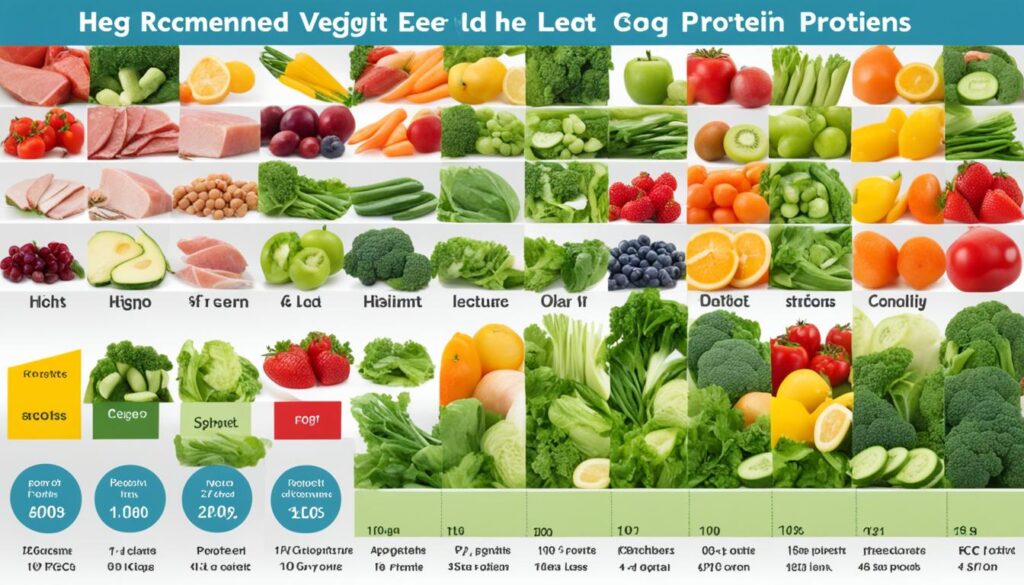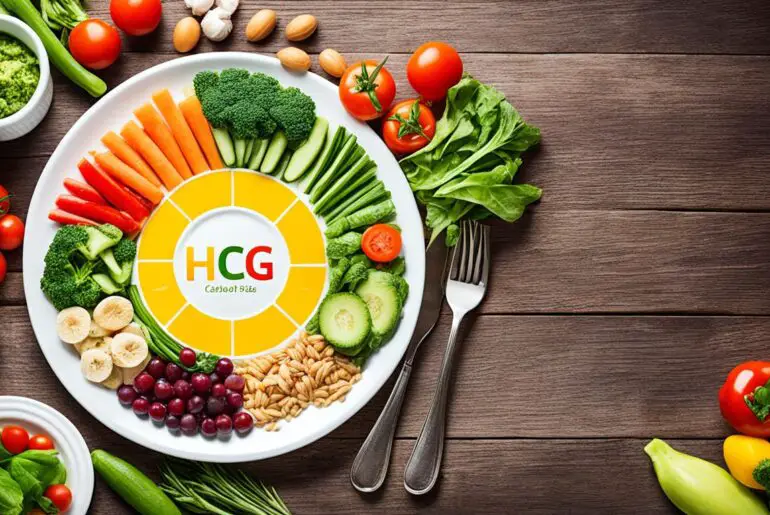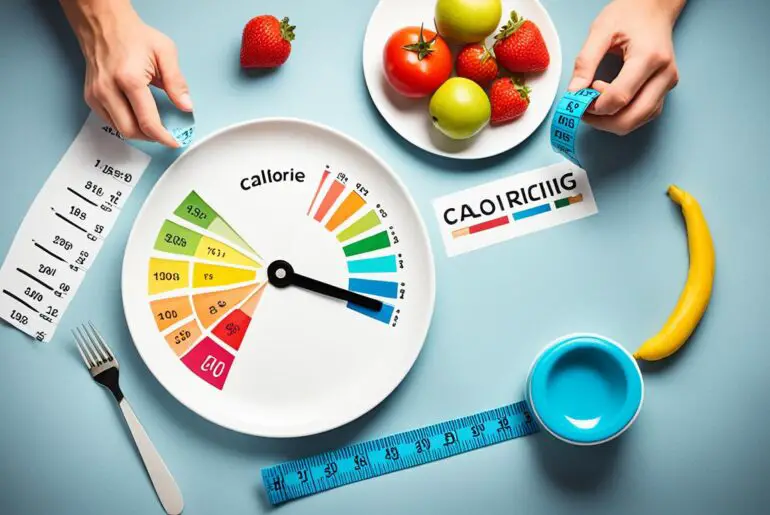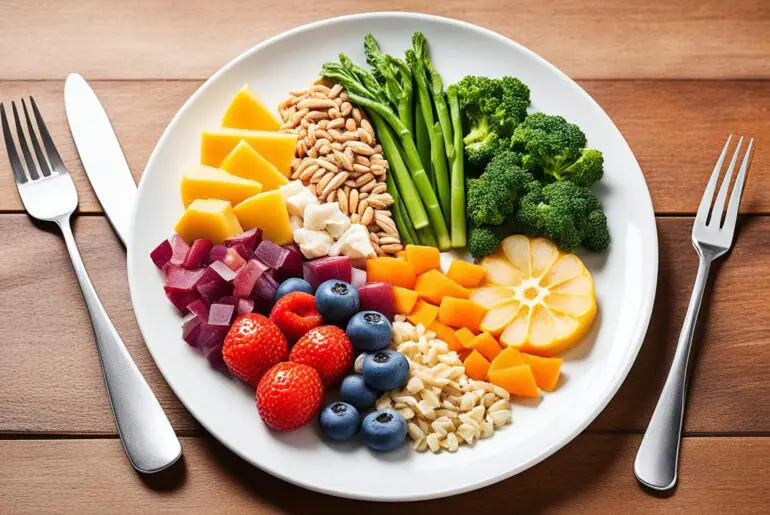Are you struggling to achieve your weight loss goals on the HCG diet? The key to success lies in effective calorie tracking. By meticulously monitoring your calorie intake, you can optimize your results and stay on track with your weight loss journey. But what are the best strategies for calorie tracking on the HCG diet? Let’s explore some expert tips and techniques to help you achieve the body you desire.
Key Takeaways:
- Calorie tracking is essential for effective weight loss on the HCG diet.
- Accurately measuring and weighing food portions is crucial for accurate calorie counting.
- Using tracking tools like food diaries or apps can aid in maintaining accountability.
- Following the approved food list and portion sizes is necessary for calorie tracking accuracy.
- Calorie tracking should be continued even after completing the HCG diet for long-term weight maintenance.
Understanding the HCG Diet
The HCG diet is a renowned weight loss protocol developed by Dr. Albert Simeons. This innovative diet plan consists of several distinct phases that work together to promote effective weight loss. By understanding the HCG diet, individuals can embrace this transformative weight loss protocol and achieve their desired results.
The various phases of the HCG diet include:
- Loading Phase: This initial phase involves consuming high-calorie foods for two days while starting the HCG hormone supplements.
- Fat Burning Phase: During this phase, individuals strictly follow a very low-calorie diet while continuing to take the HCG hormone supplements. The low-calorie intake helps trigger the body’s fat-burning mechanisms.
- Maintenance Phase: After completing the fat burning phase, individuals gradually increase their calorie intake but still avoid starches and sugars. This phase helps stabilize weight loss and adjust to a healthier eating pattern.
- Long-term Maintenance Phase: The final phase focuses on maintaining the weight loss achieved during the HCG diet. This includes adopting a balanced, nutritious diet and incorporating regular exercise into daily routines.
Throughout the HCG diet, individuals are required to consume a very low-calorie diet. The HCG hormone supplements, believed to assist with appetite suppression and metabolism boosting, accompany this restricted calorie intake. By following the HCG weight loss protocol, individuals can encourage significant weight loss and improve their overall well-being.
By adhering to the principles of Dr. Simeon’s HCG protocol, individuals can embark on a transformative weight loss journey that promotes fat burning and sustainable results. The unique combination of the HCG hormone supplements and a very low-calorie diet provides a comprehensive approach to weight loss.
Importance of Calorie Tracking on the HCG Diet
![]()
Calorie tracking plays a pivotal role in the success of the HCG diet. By closely monitoring their daily calorie intake, HCG dieters can stay within the recommended range and optimize their weight loss journey. Tracking calories on the HCG diet offers several invaluable benefits:
- Adjusting food choices and portion sizes: Calorie tracking enables HCG dieters to make informed decisions about their food choices. By understanding the caloric content of different foods, dieters can prioritize nutrient-dense options while avoiding calorie-dense foods that may hinder their progress. Additionally, tracking calories allows dieters to adjust portion sizes, ensuring they consume the optimal amount of calories to support their weight loss goals.
- Providing accountability: When following a diet, accountability is key. Calorie tracking helps in maintaining accountability by making dieters aware of their daily calorie intake. By visually seeing their progress and making adjustments when necessary, dieters can stay committed to their weight loss goals.
- Identifying deviations and addressing issues: Accurate calorie tracking allows HCG dieters to spot any deviations from their prescribed diet plan. By meticulously tracking their calories, dieters can identify any unintentional overconsumption or errors in their food choices. This awareness helps in addressing these issues promptly and getting back on track.
Overall, calorie tracking is an indispensable tool for HCG dieters, enabling them to stay focused, make mindful choices, and achieve their weight loss goals with precision.
Tracking calories on the HCG diet allows dieters to adjust their food choices and portion sizes, provides accountability, and helps identify deviations from the diet plan.
To gain further clarity, let’s take a look at how calorie tracking on the HCG diet compares to other popular weight loss strategies.
| HCG Diet | Keto Diet | Paleo Diet | |
|---|---|---|---|
| Calorie Tracking | Essential | Optional | Optional |
| Focus on Macros | Yes | Yes | No |
| Appetite Suppression | With HCG hormone | No | No |
| Duration | 3-6 weeks | Flexible | Flexible |
As the table illustrates, calorie tracking is an essential component of the HCG diet, ensuring meticulous control over the calorie intake. Compared to other diets like keto or paleo, which mainly focus on macronutrient ratios, the HCG diet places a greater emphasis on tracking calories. Additionally, the HCG hormone used in the HCG diet offers appetite suppression, assisting dieters in managing their food intake more effectively.
Tips for Effective Calorie Tracking on the HCG Diet
Tracking calories is a crucial aspect of the HCG diet to ensure precise weight loss and achieve your goals. Here are some effective tips to help you track your calories effectively on the HCG diet:
- Keep a Food Diary: Maintaining a daily food diary can provide a clear record of your calorie intake. Write down everything you eat and drink, including portion sizes and specific ingredients.
- Use Calorie Tracking Apps or Websites: Take advantage of technology and use calorie tracking apps or websites to simplify the process. These tools often have extensive databases of food items and their calorie counts, making it easier for you to track your intake accurately.
- Utilize a HCG Diet Calorie Tracker: Consider using a calorie tracker specifically designed for the HCG diet. These trackers are tailored to the diet’s guidelines and provide accurate calorie counts for approved foods. They can help you stay on track and make informed choices about your calorie intake.
- Measure and Weigh Your Food Portions: Accurately measuring and weighing your food portions is vital to get an accurate count of calories consumed. Invest in a good kitchen scale and measuring cups to ensure you’re not underestimating or overestimating your portions.
- Plan Meals in Advance: Planning your meals in advance can help you stay organized and ensure that you’re meeting your calorie goals. Prepare a weekly meal plan and consider batch cooking or meal prepping to save time and make calorie tracking more manageable.
By following these tips, you can track your calories effectively on the HCG diet, stay on top of your calorie intake, and optimize your weight loss journey.
Approved Foods and Portion Sizes on the HCG Diet

When following the HCG diet, it is vital to adhere to the specific list of approved foods to achieve optimal results in your weight loss journey. The allowable foods on the HCG diet include:
| Food Group | Examples |
|---|---|
| Lean Proteins | Chicken breast, lean beef, fish, shrimp, cottage cheese |
| Vegetables | Spinach, lettuce, cucumbers, tomatoes, asparagus |
| Fruits | Apples, oranges, strawberries, grapefruits |
| Limited Starches | Grissini breadsticks, Melba toast, rice crackers |
By selecting foods from these approved categories, you can create delicious and nutritious meals while ensuring you stay within the recommended daily calorie limit. However, portion sizes are equally important in maintaining calorie tracking accuracy on the HCG diet.
Here are the recommended portion sizes for each food group:
Lean Proteins: 3.5 ounces per serving
Vegetables: 2 cups of leafy greens or 1 cup of other vegetables per serving
Fruits: 1 medium-sized fruit or 1 cup of berries per serving
Limited Starches: 1 serving per meal (refer to specific guidelines for each type of starch)
By diligently following the approved food list and portion sizes, you can maintain accurate calorie tracking on the HCG diet, ensuring you achieve your weight loss goals while still obtaining essential nutrients.
Remember, staying committed to the approved foods and portion sizes is key to your success on the HCG diet.
Common Pitfalls and Challenges in Calorie Tracking on the HCG Diet
While calorie tracking is crucial for success on the HCG diet, dieters may encounter various challenges and pitfalls along the way. It is important to be aware of these potential obstacles to ensure accurate and effective calorie tracking. Here are some common challenges that HCG dieters may face:
- Inaccurate Food Portion Measurements: One of the main challenges in calorie tracking is inaccurately measuring food portions. Eyeballing portion sizes can result in over or underestimating calorie intake, which can hinder weight loss progress. It is recommended to use a food scale or measuring cups to measure portions accurately.
- Forgetting to Track Ingredients or Condiments: Another challenge is forgetting to track certain ingredients or condiments used in meal preparation. Oils, dressings, and sauces can significantly contribute to overall calorie intake. It is essential to track all components of a meal, including the smaller items, to ensure an accurate calorie count.
- Overestimating Physical Activity Calories Burned: Many individuals tend to overestimate the number of calories burned during physical activities. This can lead to a calorie surplus, negating the efforts of calorie tracking. Using a heart rate monitor or fitness tracker can provide a more accurate estimate of calories burned during exercise.
To overcome these challenges, it is crucial to be mindful and diligent in tracking calories on the HCG diet. Attention to detail and careful measurement of food portions can make a significant difference in achieving weight loss goals. Additionally, utilizing resources such as calorie tracking apps or websites can simplify the process and provide accountability.
“Accurate calorie tracking is the key to success on the HCG diet. By overcoming the common pitfalls and challenges, dieters can stay on track with their weight loss journey.”
By staying aware of the challenges and pitfalls of calorie tracking on the HCG diet, dieters can overcome these hurdles and ensure accurate progress tracking. The goal is to maintain a consistent calorie deficit to promote weight loss while adhering to the guidelines of the HCG protocol.
Common Challenges and Solutions in Calorie Tracking on the HCG Diet
| Challenges | Solutions |
|---|---|
| Inaccurate food portion measurements | Use food scales or measuring cups to accurately measure portions |
| Forgetting to track ingredients or condiments | Track all components of a meal, including smaller items like oils and sauces |
| Overestimating physical activity calories burned | Use heart rate monitors or fitness trackers for more accurate estimate |
Monitoring Progress and Adjusting Calorie Intake
![]()
To effectively track progress on the HCG diet and make necessary adjustments, it is important to utilize tools such as weight measurement charts and tracking charts. Regular weigh-ins provide valuable insights into weight loss progress and help identify any plateaus or stalls along the way.
By monitoring progress, HCG dieters can make informed decisions about adjusting calorie intake or reevaluating food choices to continue achieving successful weight loss. Adapting the calorie intake ensures that the diet remains optimized for individual needs, helping dieters overcome any challenges they may encounter.
Adjusting calorie intake on the HCG protocol can be done by carefully reviewing daily calorie consumption and identifying any areas for improvement. It may involve reducing portion sizes or making modifications to the types of foods consumed. These adjustments ensure that dieters continue to meet their weight loss goals and experience consistent progress throughout their HCG journey.
Tracking progress and adjusting calorie intake go hand in hand, allowing HCG dieters to stay on track and make necessary modifications as needed. The HCG diet is all about precision and effective weight loss, and by actively monitoring progress and adjusting calorie intake, dieters can achieve optimal results and reach their desired weight.
Finding Motivation in Progress Tracking
“Progress tracking serves as a powerful motivator on the HCG diet. Seeing the numbers on the scale decrease or witnessing measurements decrease can be incredibly encouraging. It reinforces that my efforts are paying off, and it motivates me to keep going. Tracking progress also helps me identify any areas where I may need to make adjustments, ensuring that I can continue towards my weight loss goals with confidence.”
– Jane, HCG dieter
Monitoring progress and adjusting calorie intake may come with its challenges, but the benefits far outweigh the difficulties. Proper progress tracking allows HCG dieters to stay accountable, make informed decisions, and maintain steady weight loss, ensuring successful outcomes throughout their HCG journey.
Maintaining Calorie Tracking After the HCG Diet
![]()
After completing the HCG diet, it is crucial to continue practicing calorie tracking to maintain weight loss and prevent weight regain. Developing long-term calorie tracking habits is essential to ensure a healthy balance between calorie intake and expenditure. By incorporating effective tracking methods into your daily routine, you can stay accountable and monitor your calorie intake accurately.
The Importance of Continuing Calorie Tracking
Calorie tracking is not just a temporary measure during the HCG diet; it is a long-term habit that can help you sustain your weight loss and promote a healthy lifestyle. By monitoring your calorie intake, you can make informed decisions about the foods you consume and maintain a calorie deficit if necessary.
Continuing to track your calories also provides valuable insights into your eating habits and patterns. It allows you to identify areas where you may be consuming excess calories or making unhealthy food choices. By recognizing these patterns, you can make necessary adjustments to maintain your weight loss long-term.
Tools for Long-Term Calorie Tracking
There are several tools and methods you can utilize to maintain calorie tracking after the HCG diet:
- Food Diaries: Continue using a food diary or journal to record your daily meals and snacks. This will help you keep track of your calorie intake and provide a visual representation of your eating patterns.
- Tracking Apps: Utilize mobile apps or online platforms specifically designed for calorie tracking. These apps often have extensive databases of food items, making it easier to track your calories accurately.
When choosing a tracking app, look for one that allows you to set personalized goals and provides nutritional information for various food items. This will aid in maintaining accurate calorie tracking.
Benefits of Long-Term Calorie Tracking
Maintaining calorie tracking habits after the HCG diet offers numerous benefits:
- Weight Maintenance: By consistently monitoring your calorie intake, you can prevent weight regain and maintain your desired weight.
- Health Awareness: Calorie tracking helps you make informed choices about the nutritional value of the foods you consume, enabling you to maintain a balanced diet and support optimal health.
- Mindful Eating: Tracking your calories encourages mindful eating, allowing you to savor and appreciate your meals while being conscious of portion sizes.
- Progress Evaluation: Long-term calorie tracking enables you to track your progress over time, providing motivation and accountability as you continue on your weight loss journey.
Conclusion
Calorie tracking is an essential aspect of the HCG diet for dieters aiming for effective weight loss. By diligently monitoring and controlling their calorie intake, individuals can achieve their weight loss goals with precision and ease. Following the approved food list, accurately measuring portions, and utilizing tracking tools are key strategies for successful calorie tracking on the HCG diet.
Maintaining long-term calorie tracking habits is crucial not only during the HCG diet but also for sustaining weight loss and promoting a healthy lifestyle afterward. By continuing to track calorie intake using food diaries, tracking apps, or other tools, individuals can ensure they maintain a healthy balance between calorie intake and expenditure.
In conclusion, the HCG diet’s success relies on the careful monitoring of calorie intake. By implementing effective calorie tracking tips and embracing long-term tracking habits, dieters can optimize their weight loss journey and experience lasting results. Remember, calorie tracking is a powerful tool that empowers individuals to take control of their health and achieve their desired weight loss outcomes.
FAQ
Why is calorie tracking important on the HCG diet?
Calorie tracking is crucial on the HCG diet as it allows dieters to monitor their daily calorie intake and ensure they stay within the recommended range for effective weight loss.
How can I effectively track calories on the HCG diet?
To track calories effectively on the HCG diet, dieters can use methods such as keeping a food diary, using calorie tracking apps or websites, and utilizing a calorie tracker specifically designed for the HCG diet.
What are the approved foods and portion sizes on the HCG diet?
The HCG diet has a specific list of approved foods that dieters can consume, including lean proteins, certain vegetables, fruits, and limited starches. Adhering to the recommended portion sizes is important to ensure calorie tracking accuracy.
What challenges can I expect when tracking calories on the HCG diet?
Common challenges in calorie tracking on the HCG diet include inaccurately measuring food portions, forgetting to track certain ingredients or condiments, and overestimating physical activity calories burned. Being mindful and diligent can help overcome these challenges.
How can I monitor progress and adjust calorie intake on the HCG diet?
Tools such as weight measurement charts and tracking charts can help monitor weight loss progress on the HCG diet. If weight loss slows down or stalls, it may be necessary to adjust calorie intake or reevaluate food choices.
Should I continue calorie tracking after completing the HCG diet?
Yes, it is important to continue practicing calorie tracking after the HCG diet to maintain weight loss and prevent weight regain. Long-term calorie tracking can help individuals maintain a healthy balance between calorie intake and expenditure.



